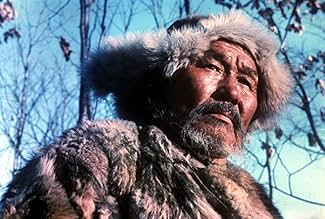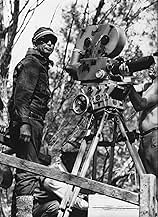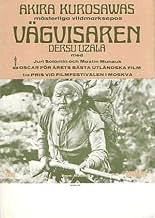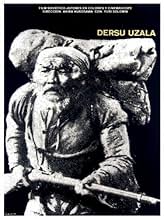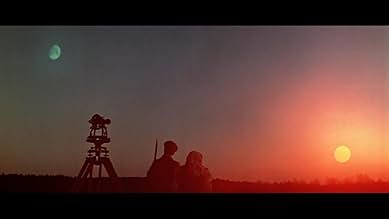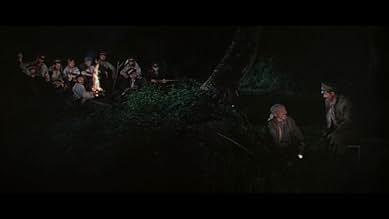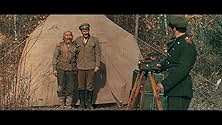An explorer is sent on an expedition to the snowy Siberian wilderness and makes friends with a seasoned local hunter.An explorer is sent on an expedition to the snowy Siberian wilderness and makes friends with a seasoned local hunter.An explorer is sent on an expedition to the snowy Siberian wilderness and makes friends with a seasoned local hunter.
- Director
- Writers
- Stars
- Won 1 Oscar
- 8 wins & 1 nomination total
Mikhail Bychkov
- Otryad Arseneva
- (as M. Bychkov)
Vladimir Khrulyov
- Otryad Arseneva
- (as V. Khrulyov)
Stanislav Marin
- Otryad Arseneva
- (as S. Marin)
Igor Sykhra
- Otryad Arseneva
- (as I. Sykhra)
Vladimir Sergiyakov
- Otryad Arseneva
- (as V. Sergiyakov)
Yanis Yakobsons
- Otryad Arseneva
- (as Ya. Yakobsons)
Vladimir Khlestov
- Otryad Arseneva
- (as V. Khlestov)
Vladimir Sverba
- Otryad Arseneva
- (as V. Sverba)
Vladimir Kremena
- Turtygin
- (as V. Kremena)
Aleksandr Pyatkov
- Olenev
- (as A. Pyatkov)
- Director
- Writers
- All cast & crew
- Production, box office & more at IMDbPro
8.235.8K
1
2
3
4
5
6
7
8
9
10
Featured reviews
Art!
Akira Kurosawa was a masterful director and powerful storyteller, Dersu has always been my favourite of his films. It was also the first I saw - on Christmas Day afternoon 1978 on UK BBC2 - would that they were as adventurous nowadays! Since then of course I've seen all of his films from Stray Dog on, Rashomon and Ran being especial favourites, but I keep on coming back to watch this one, ostensibly the simplest tale Kurosawa ever filmed.
The understanding and bonding that develops between the two men Arseniev and Dersu is wonderful to see, and over two hours holds your attention with expertly observed minutiae of character and scenic interplay. The last ten minutes cover a lot of ground (no pun intended) but it's all so logical and sad that I always need to see the end credits to recover.
So many marvellous scenes: the tiger in the forest in the morning; the phlegmatic reclusive old Chinaman; the raft; wispy blue shaded smoke from night-fires; the conclusion of course; the view of those two great men, the Moon and the Sun in the same shot. Not everyone would like Dersu, their most likely comments being "boring" - but how wrong they are they'll never know!
A film not fit to lick Dersu Uzala's metaphorical boots (or even Plan 9 from Outer Space's for that matter), Blazing Saddles was filmed the same year in America and a generation on still gets more praise than this poetic masterpiece!
The understanding and bonding that develops between the two men Arseniev and Dersu is wonderful to see, and over two hours holds your attention with expertly observed minutiae of character and scenic interplay. The last ten minutes cover a lot of ground (no pun intended) but it's all so logical and sad that I always need to see the end credits to recover.
So many marvellous scenes: the tiger in the forest in the morning; the phlegmatic reclusive old Chinaman; the raft; wispy blue shaded smoke from night-fires; the conclusion of course; the view of those two great men, the Moon and the Sun in the same shot. Not everyone would like Dersu, their most likely comments being "boring" - but how wrong they are they'll never know!
A film not fit to lick Dersu Uzala's metaphorical boots (or even Plan 9 from Outer Space's for that matter), Blazing Saddles was filmed the same year in America and a generation on still gets more praise than this poetic masterpiece!
10Anig-2
Still the best movie I have ever seen
Dersu Uzala is slow, serene, beautiful, but nevertheless gripping. It tells of the friendship between a nomadic Siberian native and a Russian army explorer, and how the former is able to help the latter and his team to negotiate the many obstacles presented by the Siberian wilderness. We see how traditional survival methods and intrinsic common sense can help the more urbanised army men to cope with the extremes of climate and geography. Eventually the nomad is persuaded to join the general on his trip back to a town. His ignorance of urban life is apparent, but interesting nevertheless, as we do not imagine such people nor meet them in everyday life today. Kurosawa is on top form here, letting the camera take in the vastness of Siberia, and still allowing the viewers to observe the characters closely. The story is interesting too, with a sadly ironic ending (won't say any more!). I think everybody should watch this film, because everybody will have something to learn from it.
10hartj-1
Dersu!! Kapitan!!
A wonderful film. It showcases the natural beauty of the Taiga and presents a contrast between the technological and the pastoral. Dersu is one with the forest. He knows its ways and its moods. The Russians scoff at his ways and his 'primitive' belief system, but eventually come to rely on him, and even love him. It is a beautiful story that takes place in an world that very few of us in the West have had a chance to see. I thought the fact that the film was set in the pre-revolutionary period gave it a peculiar sort of charm - Russia before the Great War and the Russian Revolution was innocent and even naive, the same way the Russian soldiers were innocent of the wonders and the dangers of the Taiga. One of the things I loved most about this film was the cinematography - there are long, lingering shots of the landscape, the endless steppe, the forest, the rivers, the mountains. We believe ourselves to be powerful because we have been moderately successful in our attempts to harness nature for our own uses, but the film shows us that we are deluding ourselves, that nature cannot be controlled or resisted, and the truly powerful are those, like Dersu, who co-exist in harmony with nature and learn what the wilderness teaches.
surprised by Japanese legend
It's 1902. Russian army explorer Captain Arseniev leads an expedition into the Siberian wilderness. They encounter local native hunter Dersu Uzala and recruit him as their guide.
It's a Soviet film made by the legendary Japanese filmmaker Akira Kurosawa. I'm not sure how that happened. Quite frankly, I watched the first hour without knowing about Kurosawa and was going to write that this is the best filmmaking out of the Soviet Union. The movie is over two hours and it does need to find a road map for their journey. I'm not saying that it lacks direction. It has an emotional direction. It's about the two men's relationship. I would like for more scenes of the two of them alone. They should have more heart to heart dialogue. Dersu is a great character. For example, I love the grass shelter and the two men are alone in survival mode. I'm also surprised by the tiger. The second half holds some interesting surprises. This is an interesting page in a legend's work. It won an Oscar.
It's a Soviet film made by the legendary Japanese filmmaker Akira Kurosawa. I'm not sure how that happened. Quite frankly, I watched the first hour without knowing about Kurosawa and was going to write that this is the best filmmaking out of the Soviet Union. The movie is over two hours and it does need to find a road map for their journey. I'm not saying that it lacks direction. It has an emotional direction. It's about the two men's relationship. I would like for more scenes of the two of them alone. They should have more heart to heart dialogue. Dersu is a great character. For example, I love the grass shelter and the two men are alone in survival mode. I'm also surprised by the tiger. The second half holds some interesting surprises. This is an interesting page in a legend's work. It won an Oscar.
One of the best films ever
This is one of my definite favorites.It tells a story of a man who is one with the wilderness and nature and cant live any other way.Dersu Uzala is an old Goldi(siberian asiatic minority) hunter who thinks he has been cursed after he kills a tiger.To him,every being,every part of the nature is equally worth as humans.
The film gives us accounts of one Russian captain's friendship with Dersu.They are together through thick and thin and Dersu even rescues him from a blizzard when they are stuck on a frozen lake.Dersu has all the natural senses and therefore knows when he is in danger.He knows everything by looking and observing the landscape around him.
So when he kills the tiger,its like a spell has been cast on him.Or is it just his imagination?His people believe in a ghost that rules the taiga,Kanga.He thinks Kanga will punish him in some way.Soon his fears start to get real.He cant kill his prey for food that he needs for living because his eyesight dramatically worsens.One frightening night(my favorite scene) it gets too much for him,listening to the howling wind in the dark,waiting for Kanga to send a tiger to kill him.And captain Arseniev,seeing the horror that struck him,offers him to come with him to his hometown.It happens so.
Throughout the film,you cant help but wonder what will happen to Dersu.Not only because in the beginning Arseniev searches for his grave,in retrospection,but also because he is one lonely,sad man who lives only by hunting.There is no place for him but the taiga.And when the tragedy happens,its hard not to feel remorse and pity the old Dersu.His world has come crashing down.The end specially is painful and shows that there is no mercy in this world for a man who falls from grace in his own homeground.
In the end,this film has outstanding photography,outstanding music,outstanding cast,beautiful scenery and do i need to say anything about the director? A timeless work that can never be surpassed.
The film gives us accounts of one Russian captain's friendship with Dersu.They are together through thick and thin and Dersu even rescues him from a blizzard when they are stuck on a frozen lake.Dersu has all the natural senses and therefore knows when he is in danger.He knows everything by looking and observing the landscape around him.
So when he kills the tiger,its like a spell has been cast on him.Or is it just his imagination?His people believe in a ghost that rules the taiga,Kanga.He thinks Kanga will punish him in some way.Soon his fears start to get real.He cant kill his prey for food that he needs for living because his eyesight dramatically worsens.One frightening night(my favorite scene) it gets too much for him,listening to the howling wind in the dark,waiting for Kanga to send a tiger to kill him.And captain Arseniev,seeing the horror that struck him,offers him to come with him to his hometown.It happens so.
Throughout the film,you cant help but wonder what will happen to Dersu.Not only because in the beginning Arseniev searches for his grave,in retrospection,but also because he is one lonely,sad man who lives only by hunting.There is no place for him but the taiga.And when the tragedy happens,its hard not to feel remorse and pity the old Dersu.His world has come crashing down.The end specially is painful and shows that there is no mercy in this world for a man who falls from grace in his own homeground.
In the end,this film has outstanding photography,outstanding music,outstanding cast,beautiful scenery and do i need to say anything about the director? A timeless work that can never be surpassed.
Did you know
- TriviaAkira Kurosawa had hoped to make this film as early as in the 1950s, but he had trouble adapting the story to a Japanese setting, never thinking that one day he would actually be able to film it on location in Russia, and with Russian actors.
- GoofsWhen Dersu and Arsenev are looking at the 3/4 moon and the setting sun, the moon is in the wrong phase to appear in the sky at the same time as the sun.
- Quotes
Dersu Uzala: How can people live in a box?
- ConnectionsFeatured in For the Love of Movies: The Story of American Film Criticism (2009)
- How long is Dersu Uzala?Powered by Alexa
Details
- Release date
- Countries of origin
- Official site
- Languages
- Also known as
- Uzala, der Kirgise
- Filming locations
- Production companies
- See more company credits at IMDbPro
Box office
- Budget
- $4,000,000 (estimated)
- Gross worldwide
- $14,480
- Runtime
- 2h 22m(142 min)
- Color
- Aspect ratio
- 2.20 : 1
Contribute to this page
Suggest an edit or add missing content


